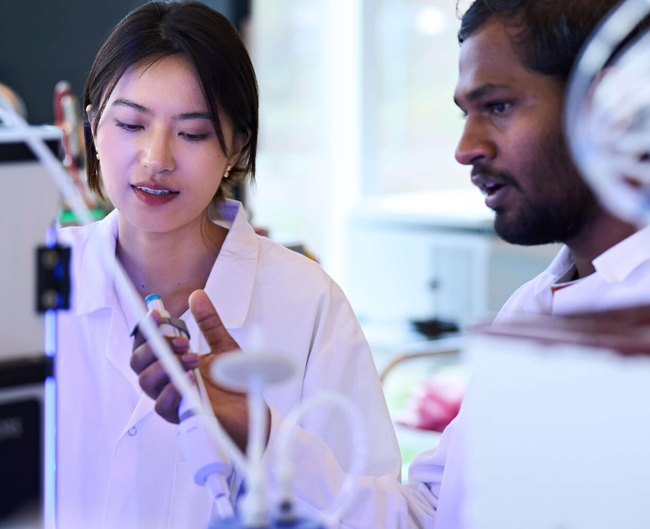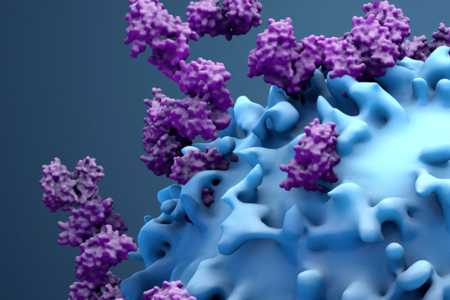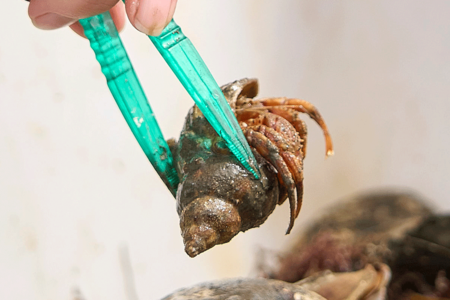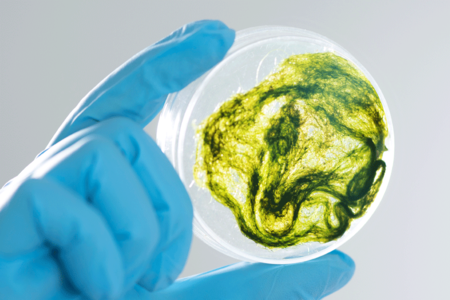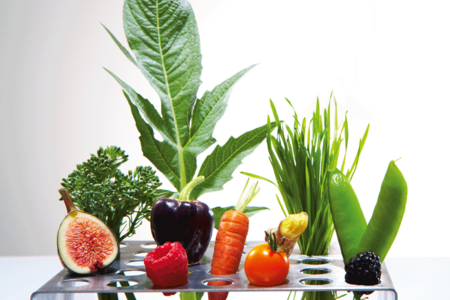About the programme
The MSc programme in Biosolutions trains you to work with the development of sustainable biological production of foods, biomaterials, biologicals, and environmental technologies.
The programme is based in Kalundborg, close to world-leading biotech companies like Novo Nordisk, Novonesis, and many others. Most courses are taught in close collaboration with the biotech industry.
The programme is offered in English.
What makes the programme at UCPH unique?
This master’s programme focuses on biological knowledge combined with technology to develop practical, sustainable solutions to global problems. Students engage directly with real-world cases and collaborate across research, policy, and innovation. The programme is based in Kalundborg, close to world-leading biotech companies like Novo Nordisk, Novonesis, and many others.Why is this programme relevant?
As society seeks sustainable answers to climate and resource challenges, biological innovation is key. Graduates are equipped to work in science, policy, consultancy, and green innovation both in industrial settings, food, agriculture and environmental issues.Join us for Open House
Admission and application
To apply for admission to this master's degree programme, you must have completed a qualifying bachelor’s degree or a similar Danish or international degree programme which is assessed to be relevant. Apply for admission via the application portal.
Below, you can read more about admission requirements and which documents to upload in the application portal.
Academic admission requirements
Here you'll find the different academic requirements depending on which qualifying degree you hold.
You meet all academic requirements if you hold one of the degrees listed below. Learn about when and how to apply. Note, however, that you still need to document that you meet the programme's language requirements.
From University of Copenhagen
- Biotechnology (bioteknologi)
- Food Science (fødevarer og ernæring)
From Aalborg University
- Biotechnology
From Technical University of Denmark
- Bachelor's degree in Engineering (Life Science Engineering) with a specialisation in Biotechnology
From Aarhus University
- Bachelor's degree in Engineering (Biotechnology) (civilingeniør)
- Bachelor of Engineering in Biotechnology (diplomingeniør)
From University of Southern Denmark
- Bachelor's degree in Engineering (Chemical Engineering and Biotechnology) (civilingeniør)
From University College Absalon
- Bachelor of Engineering in Biotechnology (diplomingeniør)
If you have a Bachelor’s degree other than those listed above, you must submit additional documentation along with your application so we can evaluate whether or not you meet the admission requirements. Learn about when and how to apply.
If you have a Bachelor’s degree, Professional Bachelor's degree or equivalent from Danish or international universities you are qualified for admission if your programme includes the following:
- 7.5 ECTS credits within a biological system (microorganisms or plants)
- 15 ECTS credits within biochemistry/organic chemistry
- 15 ECTS credits within biotechnology methods
- 15 ECTS credits within statistics/mathematics
In total you must have a minimum of 30 ECTS credits derived from courses with experimental laboratory exercises.
We may also admit applicants who, after an individual academic assessment, are deemed to possess educational qualifications equivalent to those required above.
Qualifying degree and other courses/projects
When we assess whether you meet the admission requirements for the Master's degree program, Danish legislation only allows us to assess your Bachelor's degree. Consequently, you cannot study supplementary courses between Bachelor's and Master's degree programs in order to meet the admission requirements.
If you have passed courses/projects before you complete the qualifying Bachelor's degree, these can be included in the assessment, even though they are not part of the Bachelor's degree program.
- It applies to courses/projects you have taken as single subjects and courses/projects you have taken as part of another study program.
- A maximum of 30 ECTS credits of these courses/projects may be included.
Language requirements
You are required to document that you fulfil the language requirement English B, unless you have a legal right of admission to the programme you are applying for.
Please note that you must have the documentation ready by the application deadline.
Application deadlines
Study start in September
1 March at 23:59
Application deadline for Danish applicants and applicants from within the EU, EEA and Switzerland.
Open for applications from 16 January. You will receive a reply by 10 June.
15 January at 23:59
Application deadline for applicants from outside the EU, EEA and Switzerland.
Open for applications from 15 November. You will receive a reply by 1 May.
How to apply
Choose the category below that fits you and read more about how to apply for admission. You will also find information about application deadlines and documentation on the websites.
Citizen in Denmark, EU EEA or Switzerland
Bachelor’s degree from Denmark
International bachelor’s degree
Citizen in a country outside EU, EEA or Switzerland
Bachelor’s degree from Denmark
International bachelor’s degree
Prioritisation of applicants
If the number of qualified applicants to the programme exceeds the number of places available, applicants will be prioritised according to the following criteria:
- Total number of ECTS credits in relevant courses
- Grades in relevant courses
Relevant courses include courses in biological system (microorganisms or plants), biochemistry/organic chemistry, biotechnology methods and statistics/mathematics.
Limitation on second degrees
If you have already completed a Master's degree, please check out the rules concerning a second degree.
| Admission statistics Biosolutions 2025 | |
|---|---|
| Admitted (of which have start in February) | 13 (0) |
| Admission distribution (legal right/other) | 0% / 100% |
| Applicants | 56 |
| Age average | 26 |
| Nationality (dk/international) | 23% / 77% |
Programme structure
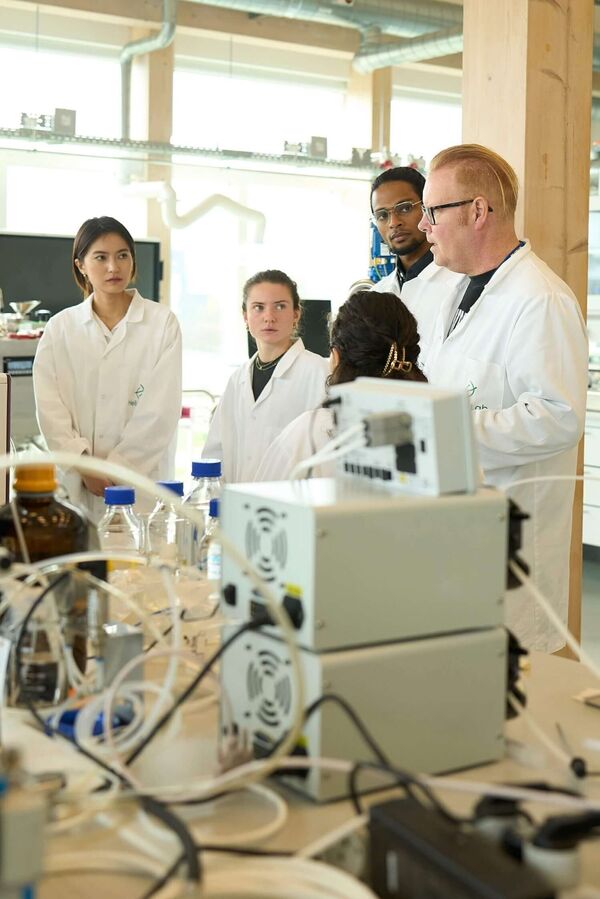
Biosolutions is a two-year Master’s degree programme. The degree programme is taught in Kalundborg, and most of the courses you follow involve real-life cases and collaboration with the biotech industry. Furthermore, you will have every chance of doing a Project in Practice or writing your Master’s thesis in collaboration with a relevant company.
In the first year of the degree programme, you take compulsory courses that provide you with the knowledge needed to be able to work with and improve the process of developing bio-based solutions in industrial contexts. You will also follow courses in data analysis and use this to optimise bio-based production as well as in the design and development of new bio-based products.
For the remainder of the first year and the beginning of the second year, you can choose between restricted elective and elective courses. You can focus on topics such as sustainable production, development of new biosolutions, regulation and legislation in production, quality control or project management.
You can also study abroad as part of your degree programme. The University of Copenhagen has exchange agreements with many universities worldwide.
Master’s thesis
You will spend most of your second year of study writing your Master’s thesis, which is equal to 45 ECTS. This is a chance to immerse yourself in a topic that you have chosen together with your supervisor and – in most cases – a relevant company. You can work on your Master’s thesis at the company or at the university.
Programme Overview
Compulsory courses: 30 ECTS
Restricted elective courses: 30 ECTS
Elective courses: 15 ECTS
Thesis: 45 ECTS
One block each year equals nine weeks of study and 15 ECTS. The table is primarily for guidance and may be subject to revision.
Year 1
| Block 1 | Block 2 | Block 3 | Block 4 |
|---|---|---|---|
| Biosolutions in Industrial Application | Data Handling and Analysis | Fermentation at Scale | Elective course |
| Bioprocess Engineering | Biological Production Hosts in Industry | Downstream Processing | Elective course |
Year 2
| Block 1 | Block 2 | Block 3 | Block 4 |
|---|---|---|---|
| Restricted elective course | Thesis | ||
| Restricted elective course | |||
Restricted Elective Courses
Choose your restricted elective courses from the list below. Click on each course for a detailed description.
- Biosolutions for Circularity and Side Stream Valorization
- Quality Assessment and Legislation - From Idea to Product
- Sustainable Processing and Production Systems
- Project Outside Course Scope (7.5 or 15 ECTS)
- Project in Practice
- Thesis Preparation Project
Do a Project in Practice or Study Abroad
You can use some of your elective courses to do a Project in Practice in collaboration with a company or an organisation. You can also choose to study abroad as part of your programme. Read more here:
Programme Curriculum
If you are more interested in the academic content, regulations, and examination requirements, you should consult the curriculum, which serves as the legal foundation for the programme.
There is both a curriculum specific to each degree programme and a general curriculum that applies across the faculty.
Please note that curricula are often revised annually. Any new versions will be published no later than during the spring semester.
Video: Master of Science in Biosolutions
Biosolutions is a new master's programme based in Kalundborg and closely connected to the biotech industry. The Head of Studies talks about biosolutions as a field of science, and Ariadna and Lukas talk about student life in Kalundborg. You also meet business representatives from two large biotech companies, both in search for graduates within the field of biosolutions.
Career opportunities
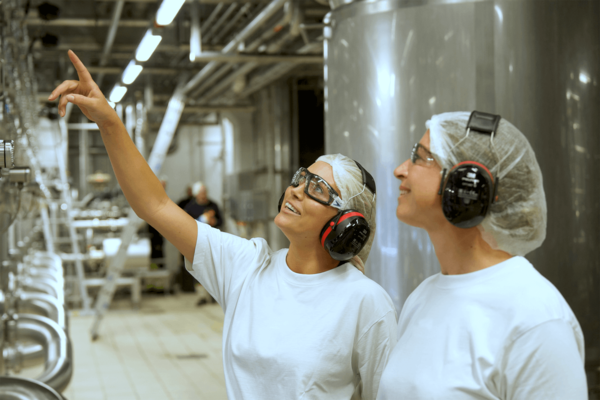
Upon completion of the master’s programme, you will obtain the title Master of Science in Biosolutions.
Biosolutions gives you an academic profile tailored for jobs in companies working with bio-based solutions. The degree programme is designed to provide you with the competences needed to build bridges between science and manufacturing companies.
Job prospects are good as Biosolutions graduates are in great demand in Kalundborg, in the rest of Denmark, and internationally.
During your studies, you will have the opportunity to collaborate with leading biotech companies, thus gaining an in-depth understanding of the development potential and business models of the biotech industry. Most of your courses combine real-life cases with the latest research in the field of biosolutions from the University of Copenhagen.
The programme is based in Kalundborg, which is a rapidly developing biotech city. A large number of biotech companies such as Novo Nordisk, Novonesis, UniBio, 21stBio and a number of small start-ups have established themselves in Kalundborg. The city is also renowned for SYMBIOSIS, a collaboration on circular resource recycling between companies based in the city.
Competence description
As a graduate, you will have acquired skills and competences that are in high demand:
- You have acquired knowledge of the entire process behind industrial production of bio-based products such as biologicals, biomaterials, or foods.
- You are qualified to work with fermentation and refining of biological raw materials using, for example, production organisms and enzymes.
- You have the skills required to control and optimise the different steps in the process such as pH value, temperatures, enzyme concentrations, water, and energy consumption.
- You can test and evaluate the different steps in the manufacturing processes to optimise quality and sustainability in production and in the finished product.
- You have the digital skills and competences needed, for example, to use data from sensors for quality control and to optimise and design new processes and products.
- You can design and develop new bio-based products – from choice of raw materials and process, to finished product.
- You have knowledge of quality assessments and all relevant legislation in the biotech field.
Depending on your choice of courses, you may also acquire competences and in-depth knowledge of legislation (including GMO) and quality control, sustainable production systems (e.g., life cycle analyses and upcycling) and project management.
Employment
Your expertise in bio-based solutions is in demand among manufacturers of e.g., ingredients, foods, probiotics, and bio-based chemicals. Job opportunities also include organisations and companies working with environmental technologies, sustainability, legislation, supervision, food safety, and plant breeding.
You can, for example, be employed to work with improving and optimising the utilisation of raw materials and other resources, product quality, circular processes and the development of new biological products and technologies.
Student life
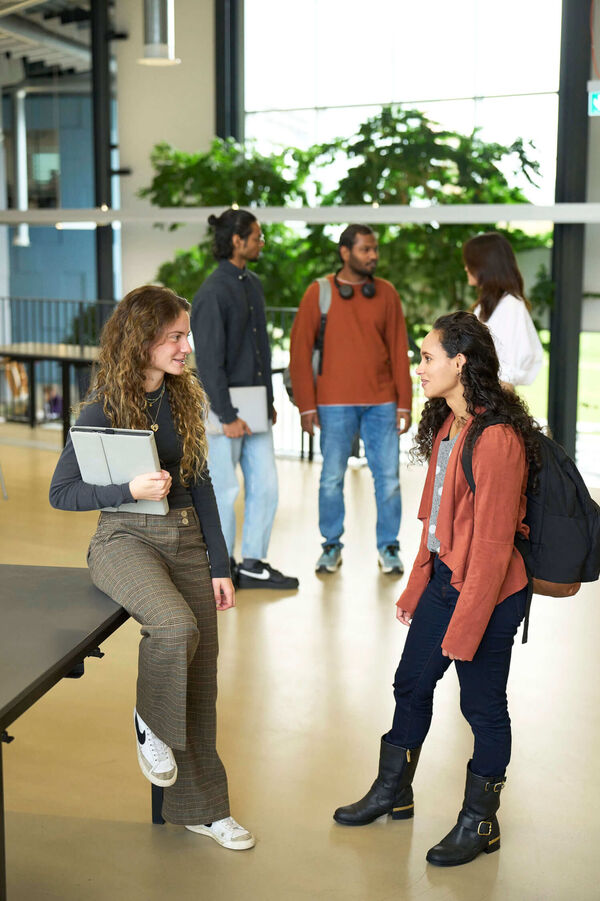
As a student enrolled in a new degree programme in Kalundborg, you will help shape a budding study environment that is also characterised by many international students. You will meet students from existing and new degree programmes at:
- Helix lab
- University College Absalon
- Technical University of Denmark (DTU)
- The Royal Danish Academy for Architecture, Design and Conservation
- Copenhagen School of Marine Engineering and Technology Management (Danish only)
Kalundborg as a University City
It is easy to get around by bicycle, and there is a train station close to the new campus that connects Kalundborg with Copenhagen and the rest of Zealand.
Kalundborg has many associations, and campus is located close to swimming and sports facilities, the city centre and library. Being near the sea, water sports activities such as rowing, windsurfing and sailing are also on offer. At the harbour, you will find beach volleyball courts, a giant outdoor screen and summer events.
In addition, you can participate in a wide range of activities right from community kitchen, city walks, reading clubs and creative meetings in SYMB, which is Kalundborg’s modern and innovative community and entrepreneurial centre at Kalundborg Station.
Accommodation
Housing prices are relatively low in Kalundborg, and it is possible to live close to both the campus area and the city centre. Read more about Kalundborg and student accommodation here:
New student housing units are being built to cater for a growing number of students.
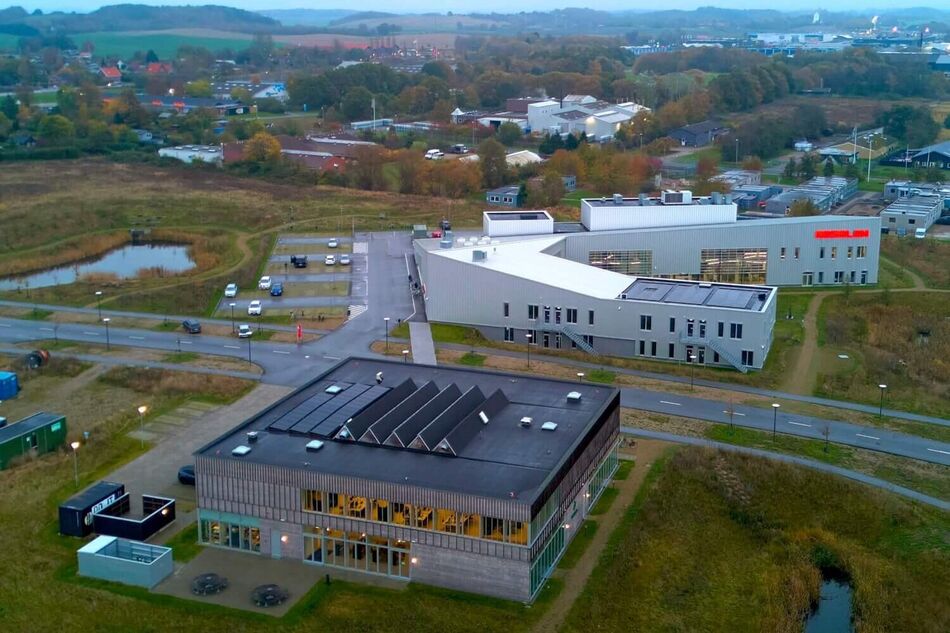
Contact student guidance
Questions about study choice and admission
Our student guidance are ready to assist you with answers to your questions about:
- application procedure and the digital application portal
- admission- and language requirements
- documentation
- study life
- career opportunities
- study choice or doubts
Did you not find what you were looking for?
You can find answers to questions most often asked by potential students in the FAQ. Read the FAQ
Questions about the digital application-portal?
Do you have questions about digital application? Check our user guide to the application portal.
In case of technical problems, please contact the IT-support by
- Mail: it-service@adm.ku.dk // Tel: +45 35 32 32 32
Location
- Campus Kalundborg, Kalundborgvej 4, DK-4400 Kalundborg.
